Журналисты провели расследование тайной деятельности ГРУ.
Несмотря на череду громких провалов и разоблачения сотен агентов, ГРУ остается одной из самых таинственных силовых структур России. Нельзя забывать и об ошибке выжившего: известны только неудачи спецслужбы, а о ее успешных операциях и обычной рутине публика знает крайне мало. Но Центр «Досье» приоткрывает завесу тайны. В нашем распоряжении оказались рабочие документы сотрудника ГРУ Дениса Смолянинова, специализирующегося на психологических операциях. Он полковник — не самый главный руководитель, но и не совсем мелкая сошка. Именно такие полковники составляют костяк среднего менеджмента военной разведки. На его примере можно погрузиться в рабочую рутину ГРУ, узнать, какие задания они выполняют и чем живут. Деятельность Смолянинова охватывает широкий спектр задач: он курирует частные военные компании, посылает агентов в Украину накануне войны, руководит информационной борьбой в телеграм-каналах и даже пытается поссорить страны НАТО. Обо всем этом — в новом расследовании.
Охота на «фашиствующего казаха»
В начале 2021 года казахский националист Куат Ахметов и его соратники начали документировать на видео, как сотрудники государственных учреждений, банков, аптек, больниц, ресторанов и магазинов отказывались говорить с ними на казахском языке. На YouTube-канале Ахметова публиковались ролики с названиями вроде «Астана Руский Фашизм казахов не обслуживают принципиально для них важно чтобы говорили на руском» или «Алматы гострабайтер Слава нацист отказывается обслуживать потребителя на государственном языке РК». Эту историю охотно подхватили второсортные российские пропагандисты: телеграм-канал «Беспощадный пиарщик» пожаловался на «фашиствующих казахов», издание «Readovka» потребовало реакции от Госдумы, а МВД на 50 лет запретило Ахметову въезд в Россию. В самом Казахстане на националиста завели уголовное дело, и он сбежал в Украину.
Вскоре скандал сошел на нет — но в ГРУ о нем не забыли. В феврале 2022 года, накануне начала полномасштабной войны, спецслужба отправила в Украину агента на поиски Ахметова. Он составил по итогам поездки подробный отчет, который лег на стол к полковнику ГРУ Денису Смолянинову. Смолянинов родился в 1976 году в Челябинске и окончил Челябинское высшее военное авиационное училище штурманов, служил в Смоленске. В середине нулевых перебрался в Санкт-Петербург и начал работать в 172 командно-разведывательном центре ГРУ (в/ч 64501). В такие центры стекается разведывательная информация для дальнейшей обработки и анализа. У 172-го КРЦ также были подразделения в Петрозаводске и Мурманске.
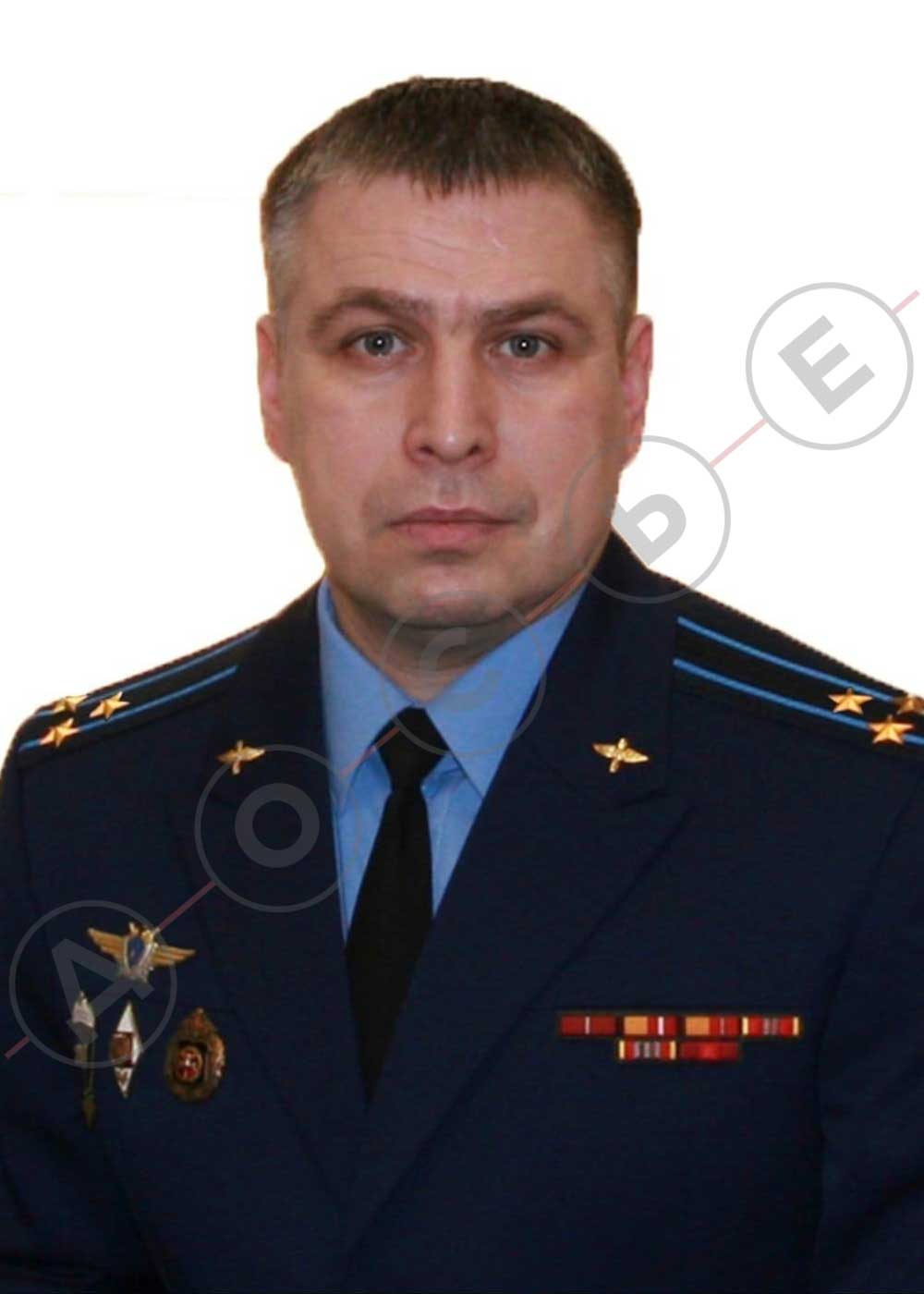
На имеющейся в распоряжении редакции фотографии Смолянинова видно три звездочки на погонах, что соответствует званию полковника. Чтобы сомнений в ведомственной принадлежности не оставалось, для фотографии Смолянинов надел значок с эмблемой ГРУ
Об этой воинской части узнали благодаря тому, что Смолянинов заказывал доставки на адрес воинской части КРЦ — улица Мира, дом 20А. В двенадцати минутах оттуда, на Кронвекрской улице, он приобрел квартиру площадью 119 кв. м. Сейчас стоимость квартир похожего метража в этой части Петроградской стороны начинается от 20 миллионов рублей. Кроме того, особо секретного разведчика выдает прописка. За последние годы журналистам удалось разоблачить сотни сотрудников военной разведки, которые были прописаны по адресу штаб-квартиры ГРУ на Хорошевском шоссе. Можно было ожидать, что Министерство обороны научится на своих ошибках и сменит методы конспирации. В случае со Смоляниновым протокол действительно изменился, но не в лучшую сторону. До 2022 года он был прописан в своей квартире в Санкт-Петербурге, но за месяц до начала войны «переехал» в Москву, на улицу Знаменка, 19. Это главное здание Минобороны.
Как следует из составленного для Смолянинова документа, казахского националиста Куата Ахметова планировали «поймать» — вероятно, чтобы вывезти в Россию. В охоте на неугодного казаха агенту ГРУ должны были помочь его связи в украинских правоохранительных органах. Но что-то пошло не так. Российскому шпиону удалось получить контактные данные Ахметова, запросить трекинг его мобильного телефона и выяснить, где он живет. Но сразу же после этого националист внезапно уехал в Турцию.
Одновременно охота началась уже за самим агентом — на ресепшене отеля он услышал, что его данные были затребованы спецслужбами, говорится в отчете о поездке. Ему пришлось в спешке покинуть Украину и за взятку пограничнику выехать в Приднестровье. Вторжение российских войск началось через четыре дня после его бегства.
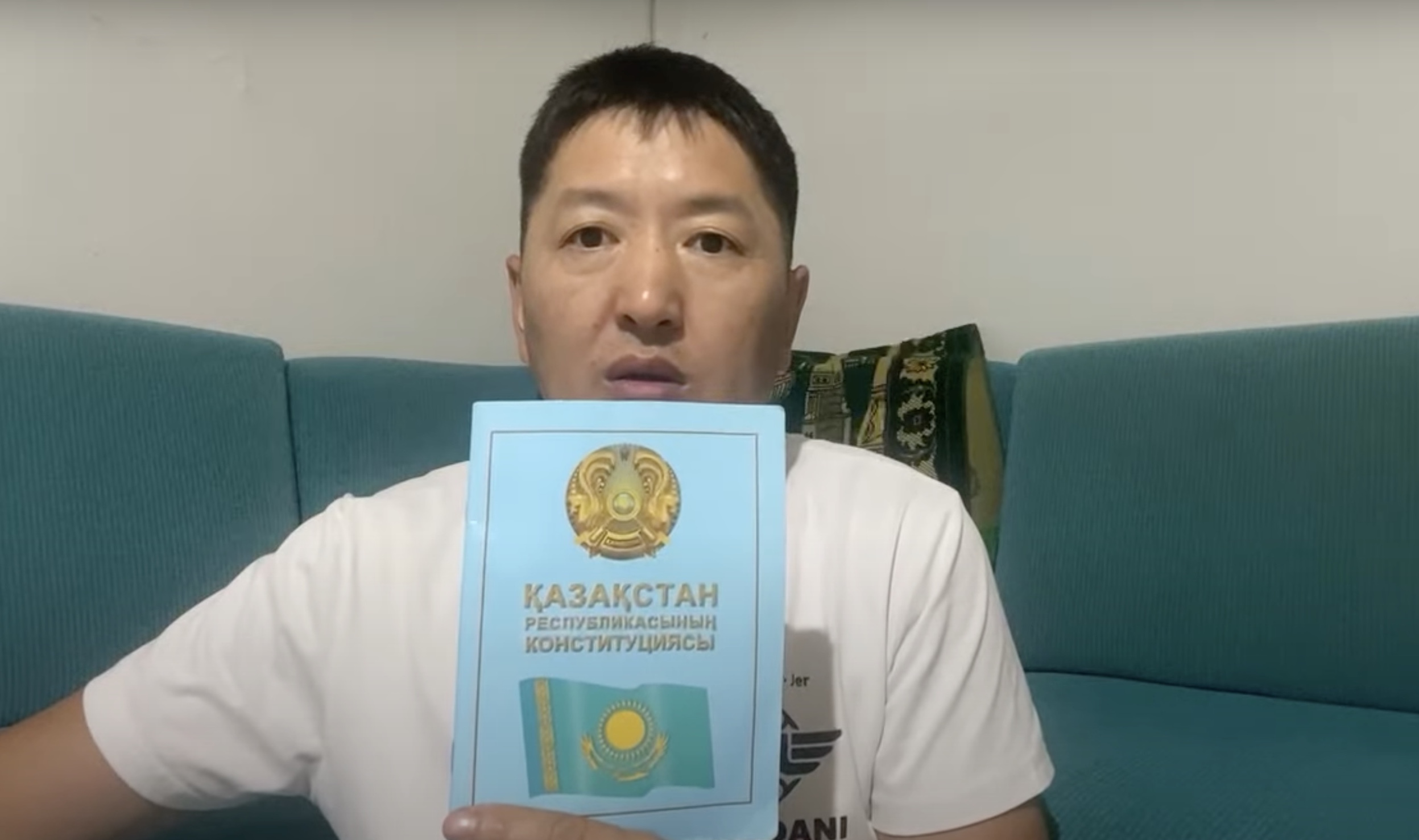
Куат Ахметов
Образ националиста
Поиски малоизвестного активиста из Казахстана накануне начала полномасшатбной войны — странное занятие для военной разведки. Но это не все, что делал этот агент ГРУ в Украине. Другим его задачами были вербовка возможных коллаборантов и наведение справок о русских националистах, поддерживающих Украину. В этом агенту помогало его собственное прошлое.
Охотник на казахского националиста попал в Украину по приглашению на имя Васильева Виктора Александровича 1985 года рождения. Человек с такими данными не оставил почти никаких следов в базах данных — можно найти лишь номер его паспорта и два исполнительных производства о неуплате налогов. Причина проста: «Васильевым» Виктор Александрович стал только в 2018 году, а до этого носил фамилию Луковенко, следует из выписки «Роспаспорта».
Виктор Луковенко — бывший аспирант экономического факультета МГУ и известный персонаж в неонацистской среде. В конце нулевых он был активистом «Русского вердикта». Эта правозащитная организация занималась помощью праворадикалам, которых судили за убийства, нападения, хулиганство и экстремизм. «Русский вердикт» был тесно связан с движением и журналом «Русский образ», глава которого Илья Горячев впоследствии получил пожизненный срок за организацию убийств и создание неонацистской банды «БОРН». Луковенко числился директором созданного в 2010 году ООО «Образ-М», которое занималось торговлей журналами.
Аспирант МГУ недалеко ушел от своих соратников: в 2011 году он был приговорен к 8 годам колонии строгого режима за убийство 58-летнего уроженца Шри-Ланки в день «Русского марша». Спустя пять лет Луковенко освободился условно-досрочно. В интервью «Таким делам» он рассказывал, что от своих убеждений не отказался, но «возвращаться к старому» не хочет — его больше радует нормальная повседневная жизнь.
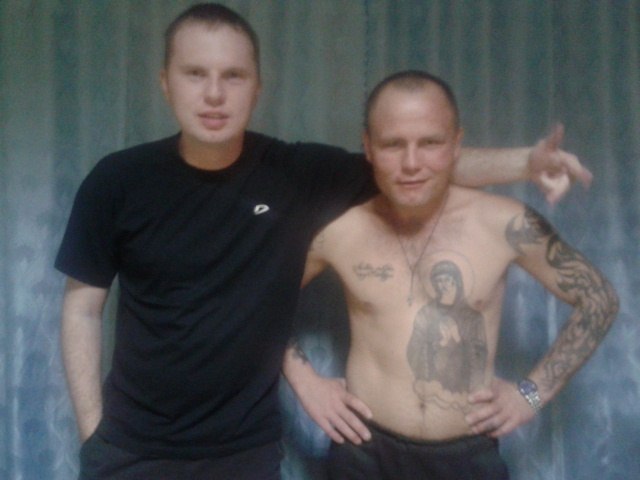
Виктор Луковенко (справа) в исправительной колонии
Сейчас в «Инстаграме» Васильева-Луковенко стоит подпись «путешествую, строю, радуюсь жизни». Но прошлое все же дает о себе знать. Из Парижа Луковенко выкладывает фотографии чернокожих пассажиров метро, жалуясь на «загрязненность» города. В еще одном посте с двусмысленным хэштегом «образ» он позирует в кепке «Division 83» (число 83 праворадикальные группировки используют как шифр «Heil Christ» по аналогии с 88 — «Heil Hitler»). О своей поездке в Киев Луковенко подписчикам не рассказывал, выкладывая в эти дни фотографии из Кыргызстана. Как он сам признается, отложенные публикации о путешествиях — его негласное правило.
Зато подробности его командировки расписаны в отчете, который лег на стол полковнику ГРУ. За две с небольшим недели в Украине Луковенко провел как минимум пять встреч — правда, большинство из них сложно назвать успешными. Например, он встречался с журналистом Дмитрием Джангировым, «убежденным антифашистом, коренным киевлянином и евреем (по отцу)», подчеркивается в документе. С Джангировым Луковенко договорился об информационной и политтехнологической поддержке, но уже через месяц киевлянина арестовала СБУ. Никаких официальных сведений о судьбе Джангирова нет. В мае 2023 года один из его знакомых сообщил, что Джангиров давно находится на свободе, но тяжело болеет.
Пропал с радаров и другой собеседник агента ГРУ, бывший нацбол Игорь Гаркавенко, уроженец Харькова. Гаркавенко в 90-е был ярым сторонником единства русских, украинцев и белорусов, основал украинскую «национально-революционную армию» и получил девять лет за поджоги офисов проукраинских организаций и израильского культурного центра. В тюрьме Гаркавенко вступил в Национал-большевистскую партию. Однако к моменту его освобождения НБП поддержала «Оранжевую революцию» 2004 года, суть которой противоречила взглядам новоявленного нацбола. Впрочем, 10 лет спустя уже сам Гаркавенко поменял позицию и читал лекции по вооруженной борьбе для активистов Евромайдана. В отчете агента ГРУ указывается, что в феврале 2022 года, «являясь убежденным русским националистом, Игорь тем не менее готовится к вооруженной борьбе за свою новую Родину — Украину».
В качестве легенды Луковенко разработал проект «Русско-украинская радикальная инициатива» (РУРИ), который должен был объединить националистов двух стран. Если верить отчету, он договорился с Гаркавенко о создании ютуб-студии, организации цикла лекций и формировании «РУРИ». Этим планам помешала война: 24 февраля 2022 года Гаркавенко перестал выходить на связь c Луковенко, а 19 марта покончил с собой. Публично о его суициде объявили только через год, поэтому Луковенко предполагал, что бывшего нацбола мог убить экс-командир «Азова» Сергей Коротких — как раз из-за его согласия участвовать в РУРИ.
Неудачей для ГРУ закончилось и другое знакомство с неким активистом из Кременчуга по кличке «Тайсон». В отчете указывалось, что он был готов к акциям прямого действия, контролировал группу из десяти бойцов и уже на следующий день после начала вторжения просил Луковенко определить его на передовую или в гражданскую оборону. Это видно на скриншоте переписки с «Тайсоном» (имеется в отчете агента ГРУ), однако из него неясно, понимал ли он, что общается с представителем российских спецслужб. В любом случае к августу 2022 года, когда был составлен отчет, «Тайсон» «полностью поддался украинской националистической пропаганде» и вступил в ряды теробороны, пишет Луковенко.
«Готов к полному взаимодействию. На текущий момент передает сведения о настроениях в обществе и возможных провокациях украинской хунты. Некоторые данные успешно использовались в текущей информационной работе», — сказано в отчете про другого украинца Юрия Клейноса. В своих соцсетях он поддерживает Украину и сборы на нужды ВСУ, но периодически критикует украинских чиновников. Заинтересовать российские спецслужбы он мог за несколько лет до этого: в 2017 году СБУ задержала Клейноса за сепаратизм и получение денег из России. По версии следствия, за 100 гривен в час он нанимал студентов для участия в протестах с лозунгами «Ровенской Народной Республики». Спустя два года Клейнос вышел из СИЗО под залог. Центр «Досье» пытался связаться с Клейносом в соцсетях, но не получил ответа.
«В свои 19 лет Лиза Симонова выглядит как подросток, но не как типичная спутница хулигана с фанатскими атрибутами одежды, грубыми манерами, жвачкой и „че, блин?“ на устах. В коридоре Бабушкинского суда, в окружении друзей, она похожа на скромную студентку-первокурсницу из интеллигентной семьи: в очках, с прижатой руками к груди папкой, невинной детской улыбкой и тихим голосом», — так описывало издание «Лента.ру» молодую участницу неонацистской банды Максима Марцинкевича «Реструкт». Ее прозвище — Лиза Лютая. Как и Марцинкевич, она была арестована по делу об избиении и грабеже лиц неславянской внешности. В 2018 году Симонову приговорили к двум с половиной годам колонии, а второе уголовное дело вскоре закрыли из-за истечения срока давности. Симонова вышла год спустя, а в 2021 году переехала в Украину.
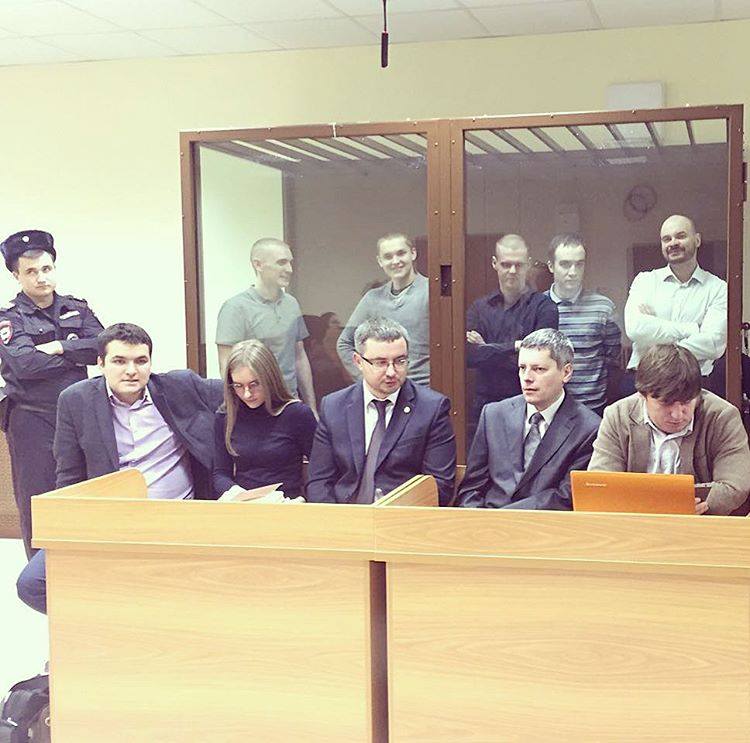
Лиза Симонова (вторая слева в переднем ряду) в зале суда
Из всей командировки Луковенко только встречу с Симоновой можно было назвать полезной для российских спецслужб — настолько, что на нее он составил отдельную справку. Согласно документу, Лиза Лютая была ближайшей соратницей экс-командира «Азова» Сергея Коротких по кличке «Боцман», поддерживала множество контактов с неонацистами в России и рассказала агенту ГРУ о своей близкой связи со знаменитой в узких кругах сотрудницей ФСБ Яной Бежановой. Как писали в «Живом журнале», в начале нулевых Бежанова тренировалась с членами Национал-большевистской партии, а затем была завербована Управлением по защите конституционного строя ФСБ и стала курировать право- и леворадикальные движения.
Симонова и ее окружение, если верить Луковенко, получали финансирование от олигарха Игоря Коломойского, а президента Украины Владимира Зеленского называли не иначе как клоуном. До начала полномасштабной войны они якобы готовили переворот и готовы были сотрудничать с любыми союзниками, чтобы сменить «лево-либеральный курс» украинского правительства. Если такие планы и были, то российское вторжение их разрушило. Теперь, как видно из соцсетей, Лиза Лютая раздает гуманитарную помощь в Херсоне и позирует с украинскими дронами.
Однако возможно, что информация от Симоновой помогла спецслужбам уже после начала войны. В итогах командировки Луковенко упоминает, что члены одной из экстремистских групп, на которую он составил справку, были задержаны во время организации покушения на российских медийных лиц. За период, который охватывает отчет, в СМИ рассказывали только об одном таком покушении — на пропагандиста Владимира Соловьева. Его неудавшимися убийцами были неонацисты, которых следствие называют членами банды NS/WP.
Еще одним эпизодом, который может подходить под это описание, было убийство в Волгоградской области членов «Реструкта», которые якобы пытались взорвать газопровод по заказу СБУ. Хотя о покушении на известных людей в новостях речи не шло, «куратором» ликвидированных нацистов СМИ называли Андрея Чуенкова по кличке Дед88. Он был указан в справке Луковенко на Симонову как ее близкий соратник.
Симонова сказала Центру «Досье», что не знает человека по имени Виктор Васильев или Луковенко. После того, как мы отправили ей фотографию агента ГРУ и скриншот ее переписки с ним из отчета, она перестала отвечать на сообщения.
Какие признаки указывают на то, что отсидевший неонацист Виктор Луковенко выполнял в Украине задания ГРУ? Во-первых, в его отчете используется характерный жаргон разведчиков: например, получение приглашений в Украину называется «легендированием». Во-вторых, к отчету приложен и бюджет проекта, то есть это не частная инициатива Луковенко. Сам он, как следует из документа, за свою работу ожидал месячного вознаграждения в размере 2000 в необозначенной валюте (вероятно, доллары).
Наконец, тот факт, что Васильев-Луковенко работал в интересах ГРУ, подтвердил его куратор Денис Смолянинов. Корреспондент «Досье» позвонил военному разведчику, представившись оперуполномоченным костромской полиции. С журналистами полковник ГРУ разговаривать бы не стал, поэтому мы сказали, что в нашем отделении полиции задержан некий Васильев, который утверждает, что работает на… «Ну понятно, я понял, на какую организацию», — охотно подтвердил наши догадки Смолянинов. Для верности мы уточнили, что речь идёт о ГРУ. «Это уже косяк», — вздохнул полковник.
Из разговора стало понятно, что Смолянинов действительно осведомлён о деятельности Луковенко, но был удивлен, что агент знает его имя и номер. Изначально разведчик не смог вспомнить такого человека, но «оперуполномоченный» напомнил ему несколько деталей — агент был в Украине перед началом вторжения и встречался с националистами. Полковник ответил, что понял, о ком речь, и пообещал перезвонить. Через 5 минут он сообщил нам, что настоящий Васильев не может быть в нашем отделении полиции.
«Данный человек сейчас не может находиться там, под той фамилией, которую он называет. И находиться там, где он у вас сейчас находится. Это либо вообще какая-то подстава. Либо левый человек, который знает того, но называет себя чужим [именем]. Тот человек очень далеко сейчас. Поэтому это вообще левак. Но если все серьезно, если там никак… Мне в принципе сейчас все равно, просто очень интересно, откуда этот крендель так много знает. Понимаете, даже тот человек не должен знать мой телефон. Вот и все, что я вам скажу… [неразборчиво] там по полной, телефон остался у вас. Если там он может находиться, у вас в Костроме, то я перезвоню и будем этот вопрос решать. Если нет, то это вообще не тот человек и, скорее всего, это какая-то шляпа», — верно угадал полковник.
Центр «Досье» связался и с самим Васильевым-Луковенко. Человек, который нам ответил, сообщил, что в Украине он не был, Смолянинова не знает, и вообще он «не Виктор, точнее, Виктор, но не Александрович».
Телеграм-война
«Ховайтесь москалики) всех найдут, и всех посадят», — комментирует телеграм-канал «інша країна» новость о заведенном в Кыргызстане уголовном деле против участника так называемой СВО. С виду это обычный небольшой проукраинский телеграм-канал. Авторы пишут, что любой критик Владимира Зеленского — «потенциальный агент москалей», и поддерживают обстрелы Белгорода украинскими войсками. Но дьявол кроется, как всегда, в деталях. Одна из последних оригинальных записей в канале — ссылка на акцию «Стоп Эрдоган». После того, как землетрясение в Турции унесло жизни 60 тысяч человек, в Париже появился баннер с украинским флагом и надписью «Эрдоган, землетрясение — это расплата за русских туристов! Аланья следующая», а по всему городу было нанесено 105 трафаретных граффити: «Стоп ислам», «Стоп Эрдоган» и «Аланья следующая». Цель мероприятия — показать неблагодарность украинцев и подлить масла в огонь конфликта между Турцией и странами НАТО. Отчеты об этой акции нашли там же, среди рабочих документов Дениса Смолянинова.
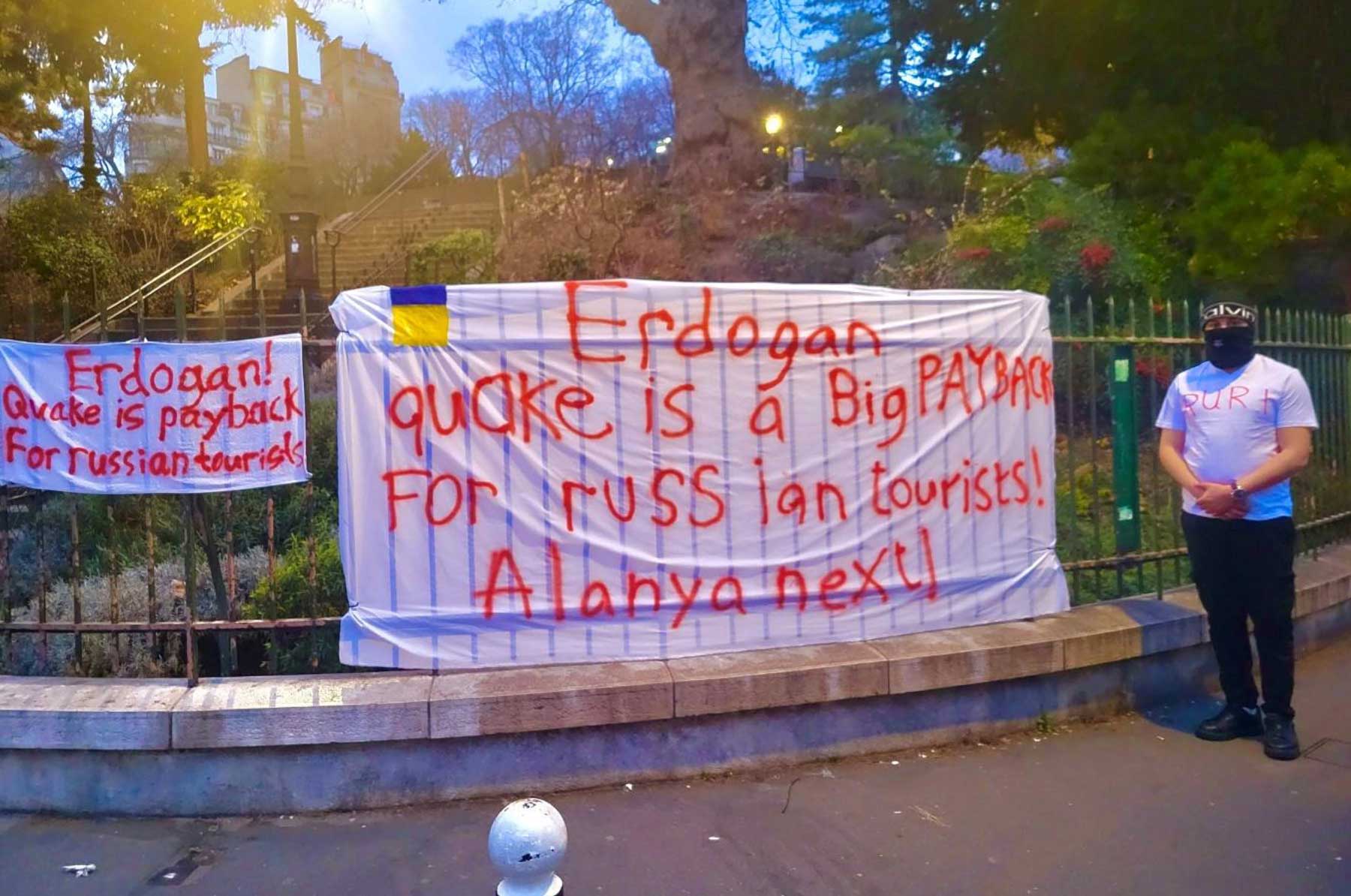
Фото с акции «Стоп Эрдоган»
На фотографии с акции возле баннера с украинским флагом стоит мужчина. Его лицо закрыто балаклавой, зато на футболке — уже знакомая нам надпись «RURI». Это отсылка к тому самому проекту «Русско-украинская инициатива», который Виктор Луковенко развернул под кураторством ГРУ. А телеграм-канал «інша країна» — часть многопрофильной сетки спецслужбы. В нее входят как проукраинские, так и пророссийские каналы, и у каждого своя задача. Например, через «іншу країну» организовывались сборы якобы на нужды украинской армии, деньги от которых на самом деле шли военным из самопровозглашенных ЛНР и ДНР. Список каналов и отчеты о таких акциях приведены все в том же отчете Виктора Луковенко.
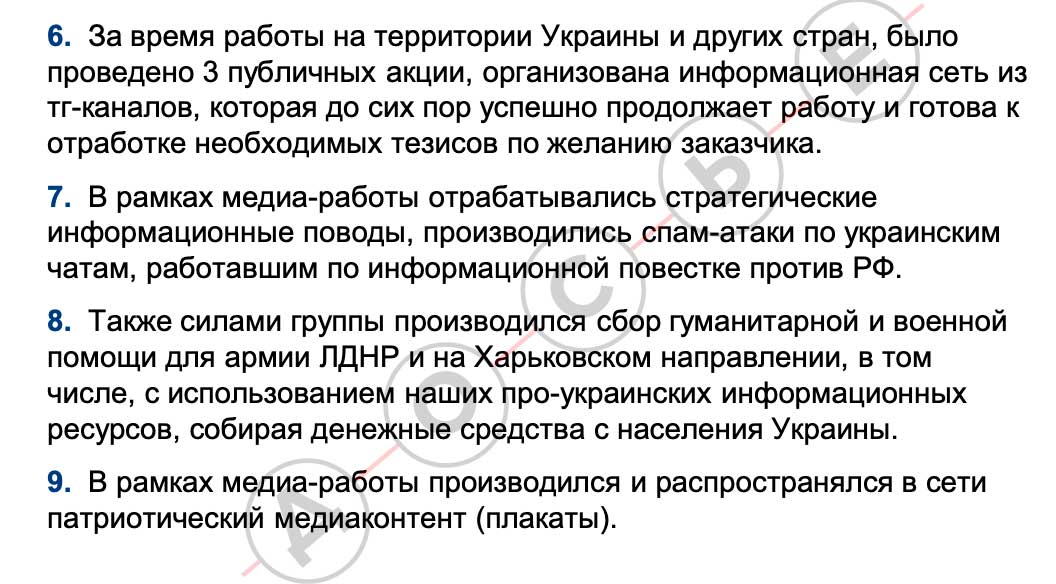
Отчет о работе сетки
После публикации расследования Центра «Досье» об акции «Стоп Эрдоган» «іншу країну» почти забросили — с апреля по декабрь 2023 года там вышло только четыре поста. Зато другой канал — «iнiй» — активен до сих пор. Авторы обещают провести читателей «по тонкому льду украинской политики». Свой лозунг канал приводит в одном из постов: «Держи порох сухим, а дупу в безопасности». Лирический герой канала — разочарованный украинец-эмигрант с антисемитским уклоном. Основной контент — критика украинских властей и упаднические настроения.
«Украинская реальность сейчас так отконфигурирована нациками и олигархами, что мокшу устроит только тотальное военное поражение Киева. А после него, нас, хохлов, останется миллиона три. Остальные окажутся сепарами со справкой подпольщика с 2014-го года и будут нас активно хуесосить. Некоторые из нас подобную хуйню видели при развале Союза. Но! Хуесосить будут хохлов, а виноватыми окажутся евреи», — рисует мрачную картину «iнiй». Логику этого высказывания проследить трудно, но на канал подписано больше 50 тысяч человек.
Именно «iнiй» наиболее активно использовали для информационных вбросов после начала вторжения, следует из отчета Луковенко. Канал публиковал новости об убийстве мирных украинцев из-за раздачи оружия населению, критиковал территориальную оборону и ВСУ, а также называл тогдашнего советника президента Алексея Арестовича «голимым пиздоболом». Все это, по задумке, должно было подорвать моральный дух украинцев. Канал также высмеивал экс-командира «Азова» Сергея Коротких («Боцмана») — очевидно, то ли у самого Луковенко, то ли у ГРУ к нему особые счеты. Чуть меньше вбросов появлялось в «іншій країні»: например, там ждали оккупации Украины Польшей, намекали на разворовывание гуманитарной помощи украинскими властями и обвиняли в шпионаже в пользу России уехавшего в Украину русского неонациста Алексея Барановского (он был координатором «Русского вердикта», с которым в нулевые сотрудничал организатор сетки Луковенко). Оба канала были созданы накануне войны — один в декабре 2021-го, а другой в январе 2022 года. Как следует из документов полковника ГРУ, администраторы каналов получали по 1500 у. е. в месяц.
Последний «украинский» канал все той же сетки — «Байки Дюковского парка». Автор позиционирует себя как коренного одессита с контрабандистским прошлым. Как и остальные два, этот канал был создан незадолго до вторжения. Первый пост был знакомством с читателями, второй начался с признания в любви к Одессе, а закончился критикой «киевского рагулья», которое заполонило город.
Январь 2022 года «одессит» провел за оскорблениями украинских президентов, критикой СБУ и жалобами на «белых господ-амеров», которые правят Украиной из-за океана. Примечательно, что канал еще до 24 февраля убеждал подписчиков, что, во-первых, никакого российского вторжения не будет, а во-вторых, оно будет, но по вине самой Украины.
«Эрефия воевать не хочет, и Путину лишь бы качать в Европу газ и чтобы его оставили в покое, — больше этому пенсионеру ничего не надо. Но тут ведь как — вы то можете и довыебываться. Вы так долго орали и провоцировали, что Путин нападэ, что перестали в это верить. А вот я смотрю, что в РФ сразу не верили, а теперь… задумались. А почему бы и нет».
Первым делом после начала вторжения автор канала предложил украинцам сдаться, чтобы на Одессу не упала ни одна ракета, а затем призывал горожан выгонять украинских военных с позиций внутри города. В марте канал объявил о создании в Одессе третьего фронта — против украинских военных, которые, по его словам, прикрываются городом, а потом уйдут, оставив на его месте руины. В апреле, после затишья длиной в месяц, автор пообещал рассказать, чем он был занят и почему «рагули наебнутся, а Одесса выживет», но после этого умолк уже навсегда. Вполне вероятно, что автором был реальный одессит: глава сетки Луковенко в своем отчете упоминал, что провел несколько дней в Одессе. Что с ним случилось, из документов неясно, однако в отчете указано что за февраль–август 2022 года двое «ключевых исполнителей» были убиты. Один из «убитых» — экс-нацбол Гаркавенко (который на самом деле покончил с собой), а вторым мог быть как раз одессит-матерщинник.
Еще один участник проекта РУРИ погиб через полгода после составления отчета. Это политтехнолог и Z-патриот Игорь Мангушев — его называли одним из основателей частной военной компании «Е.Н.О.Т.». «Немного пиарщик, немного политтехнолог, немного военный. Аферист и наемник», — описывал себя сам Мангушев в своем телеграм-канале «Zаписки Авантюриста».
«Аферист и наемник» прославился выступлением в оккупированном Донецке в августе 2022 года, во время которого он держал в руках череп, по его словам, защитника Мариуполя. Мангушев говорил, что Россия воюет «с идеей Украины как антироссийского государства» и «все носители этой идеи должны быть уничтожены». Через полгода неизвестный выстрелил уже в его череп, и Мангушев скончался в луганской больнице.
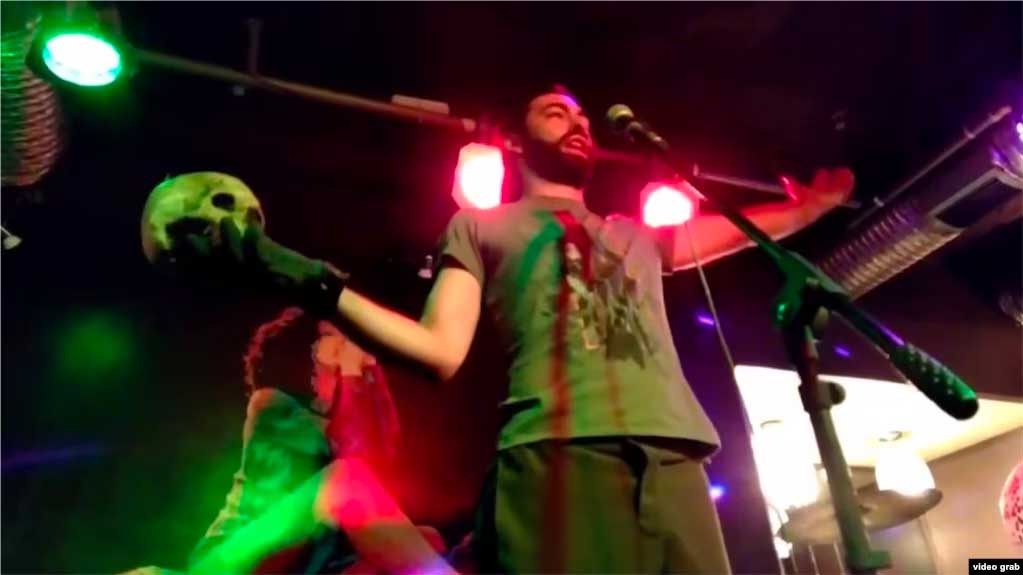
Игорь Мангушев с черепом
Телеграм-канал «Zаписки Авантюриста» был главным активом в Z-крыле сетки под контролем Дениса Смолянинова. Через него полковник ГРУ занимался настоящей информационной войной: Мангушев организовывал спам-атаки на украинские службы первой помощи и официальные чаты, устраивал массовые ложные звонки о минировании школ и больниц.
«Сфоткайте бомжа во дворе и распространите его фото в украинских чатах и группах, с пометкой, что это корректировщик. Сочиняйте и вбрасывайте фейки про машины, с которых ведется корректировка. Создавайте панику и хаос», — советовал подписчикам Мангушев.
В отчете Луковенко указано, что за первые несколько месяцев войны таким образом «было „заминировано“ более сотни объектов и отправлено порядка 10 000 сообщений о „диверсантах“, „корректировщиках“». Именно через Мангушева в «ЛДНР» попадала гуманитарная помощь, собранная в псевдо-украинских телеграм-каналах «iній» и «iнша країна».
Судя по документам, Мангушев, как самое медийное лицо команды, должен был стать политическим лидером «Русско-украинской радикальной инициативы» — за это ему полагалось по 4000 у. е. в месяц. Например, вместе с Васильевым-Луковенко он участвовал в аналитической передаче «Круг Мнений» на YouTube.
Программа, помпезно называющаяся «экспертным клубом» при информационной поддержке издания «Ридус», в действительности представляет из себя аудиокомнату для авторов прокремлевских телеграм-каналов. «Круг Мнений» проводит даже выездные заседания (например в Казахстане). Несмотря на поддержку «Ридуса» и ГРУ, каждый выпуск слушает по несколько сотен человек. Больше тысячи просмотров набрало только два видео из семидесяти двух. Впрочем, в отчете для Смолянинова эта статистика тактично умалчивается.
Главным организатором этой передачи указывается телеграм-канал «Дипломатия» — еще один ресурс Z-сетки Луковенко. Он держит гораздо более нейтральный тон и освещает вопросы международной политики, но все еще с упором на Украину.
Наконец, последний канал, включенный в отчет, — «скажи паляниця» с двумя тысячами подписчиков. Он создан для противостояния украинской военной пропаганде и может считаться российским ответом НАФО. Большая часть оригинального контента — мемы низкого качества.
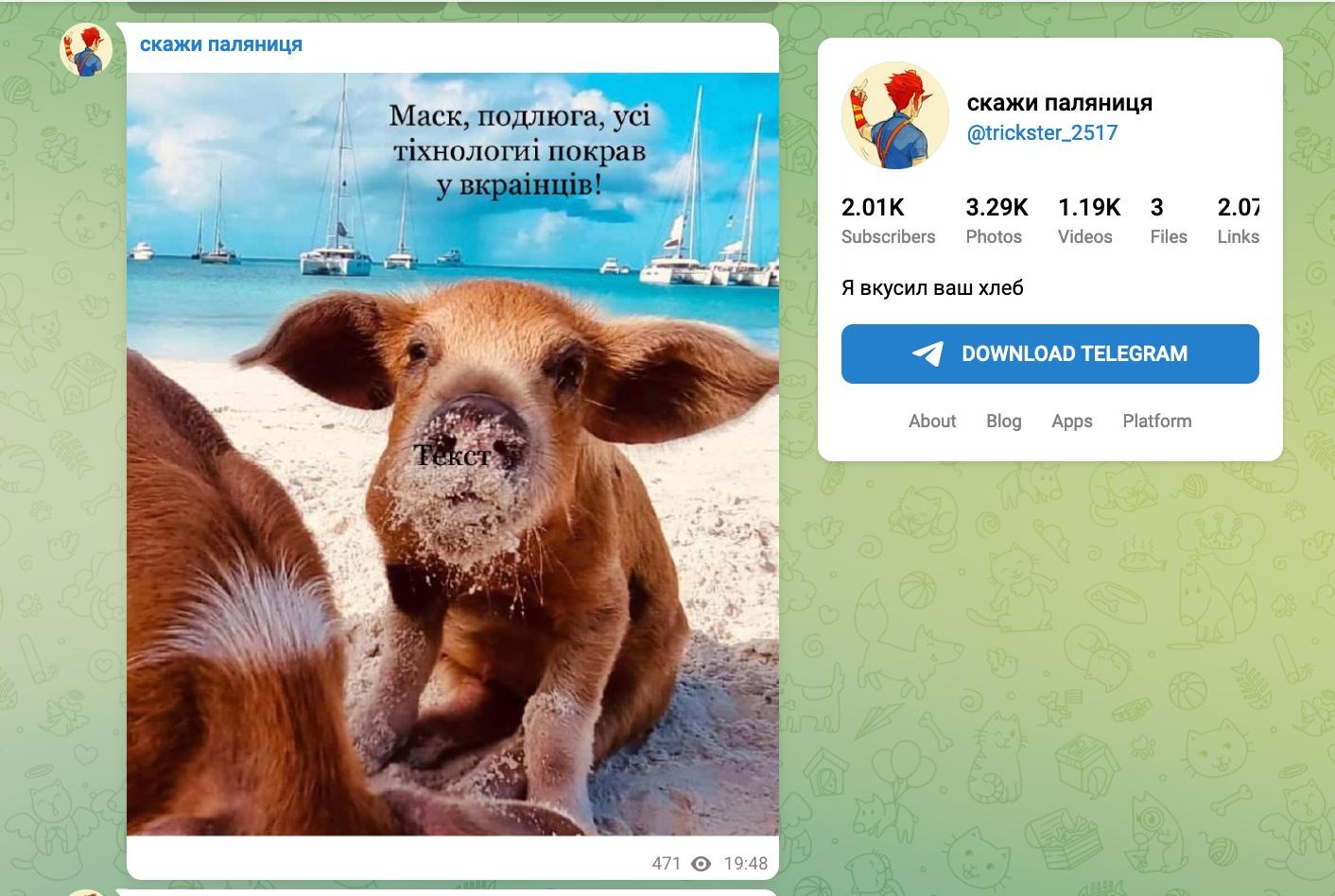
Свой личный телеграм-канал «Улыбаемся&Машем» на 8 тысяч подписчиков Луковенко в отчет включать не стал. В нем отсидевший за убийство темнокожего неонацист выступает как эксперт по Африке. Тон постов аналитический — мата и оскорблений, в отличие от других площадок, там почти нет. Вероятно, благодаря своему каналу Виктор Васильев-Луковенко в феврале 2023 года попал под санкции Украины. Проект All Eyes On Wagner называл его частью «машины влияния» Пригожина в Африке и указывал, что Луковенко знаком с сотрудниками «фабрики троллей». Многие из них вошли в тот же пакет санкций, что и он. Полковник Смолянинов, пытаясь вспомнить Луковенко, также говорил, что тот занимался информационной работой «с Вагнерами».
Это было в разведке
Охота на казахского националиста, информационные вбросы и в основном неудачная вербовка коллаборантов в Украине — этим работа под началом Дениса Смолянинова не ограничивается. Украинским направлением он занимается как минимум с 2014 года. Уже в августе 2014-го через него проходили списки наемников для отправки на Донбасс — искали людей с военным прошлым, хотя у некоторых были проблемы с законом. Тогда же сам Смолянинов несколько раз летал в Ростов-на-Дону — ближайший аэропорт к границе с Украиной.
Подрывом международного имиджа Украины на международной арене он занимался и до начала полномасштабного вторжения. Например, летом 2021 года через него проходило предложение о проведении в Италии онлайн-конференции «Украина как failed state — угроза для Европы». В качестве спикеров рассматривались члены теперь уже правящей партии «Братья Италии» — например, Маурицио Марроне, известный своей публичной поддержкой «ЛДНР».
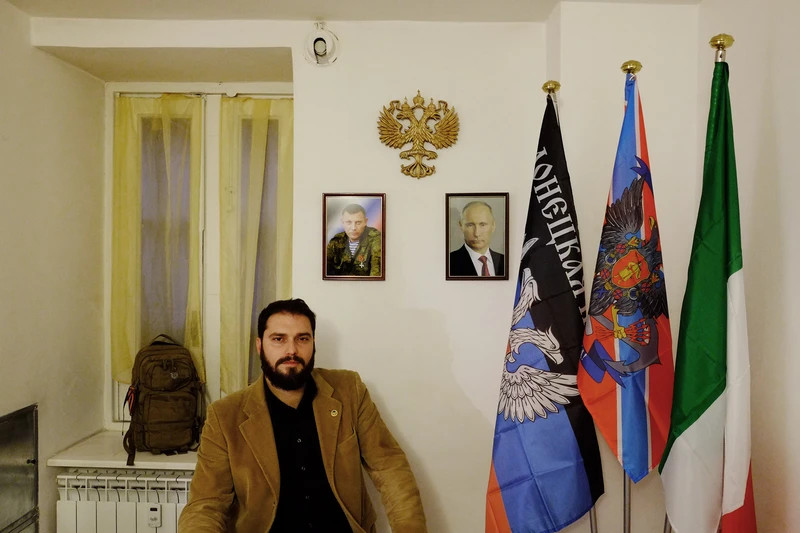
Маурицио Марроне с флагами «ДНР» и «Новороссии»
Тезисами конференции должна была стать привычная пропаганда Кремля: Украиной управляют американцы, а страдают от этого Россия с Европой. «Италии надо выйти из-под внешнего управления и проводить курс на „реалистскую“ политику во внешнеполитических отношениях», — такой должен был быть лейтмотив у мероприятия. Неустановленный автор предложения запрашивал 5000 долларов на гонорары участникам и еще 17 500 — за размещение новостей о конференции в СМИ и итальянских ютуб-каналах. Себе он запросил скромные 3000. Впрочем, Центру «Досье» не удалось обнаружить свидетельств того, что конференция действительно состоялась.
Среди документов Смолянинова можно обнаружить и отчет о взломе оборонных предприятий в Украине, датированный летом 2022 года. Хакеры нашли список украинских заводов в «Википедии», начали с буквы «а» и выкачали некоторые документы приборостроительного завода «Арсенал». Также они провели тестовые DDoS-атаки на различные украинские учреждения — от министерства культуры до центра антивирусной защиты информации — и просили согласования для продолжения «деструктивных работ». «Вам предоставлена информация. Дальнейшие действия должны быть согласованы с вашей стороны. Коллеги ждем обратной связи», — рапортовали взломщики.
Отчет о кибератаках полковнику ГРУ передал Дмитрий Юрченко — начальник отряда казачьей милиции в Санкт-Петербурге «Казачья стража» из 1200 человек и выпускник балетной академии. Корреспондент «Досье» позвонил Юрченко, представившись сотрудником ФСБ, который хочет поговорить об «информационной деятельности» Смолянинова по украинским предприятиям. Юрченко ответил, что последний раз они с полковником обшались в том же самый день, но сказал, что ему некомфортно обсуждать такие темы по телефону.
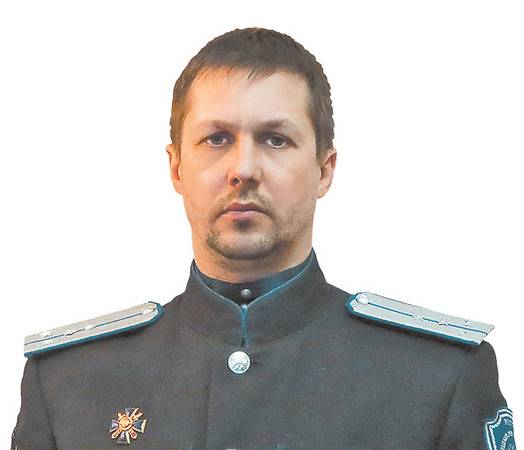
Дмитрий Юрченко
Наконец, Смолянинов занимался и более близкой к профилю Минобороны (этому ведомству подчинено ГРУ) деятельностью. Именно он, судя по всему, был куратором двух ЧВК, связанных с Минобороны. Первая — «Лонгифолия», военная компания криминальных авторитетов из 90-х, через которую налаживали контакты с западными ЧВК. Это сотрудничество закончилось, когда основатели «Лонгифолии» вновь вернулись на скамью подсудимых за рейдерство. Зато «взлетела» вторая ЧВК, которую опекал Смолянинов: военно-охранная компания «Конвой» под руководством любителя казаков Константина Пикалова.
Психологические операции до сих пор оставались одним из самых секретных направлений деятельности российской военной разведки — немногие доступные публично свидетельства и документы касались лишь событий 20- или даже 40-летней давности. Документы Дениса Смолянинова позволяют заглянуть в самое сердце информационной войны — и увидеть, как под кураторством ГРУ заводятся низкопробные телеграм-каналы на несколько тысяч подписчиков, разгоняется топорная пропаганда и проводятся «публичные акции», где мигрантам приходится изображать неблагодарных украинцев. Соответствует ли это загадочному образу военного разведчика из популярных романов — судить читателю, но на фоне Смолянинова похождения Петрова с Бошировым уже вряд ли выбиваются из общего ряда.


